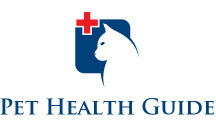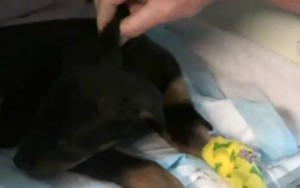Canine parvo virus is a life threatening disease, particularly in puppies. It is a highly contagious disease that attacks the intestinal lining of dogs. It can also damage the heart muscle in very young and unborn puppies. All dogs are at risk, but particularly puppies less than 4 months of age as the immunity from the mother wears off and before vaccination takes place.
Rotweillers and Doberman Pinchers have an increased vulnerability to the disease.
Contents
How Parvo is Spread from Dog to Dog
The virus is passed in the stool of an infected dog. Even trace amounts of feces can contain enough virus to infect a dog. The virus can last in the environment for a long time and is resistant to changes in the environment such as weather. The virus is spread when ingested by an un-vaccinated dog or puppy whose immune system is not fully developed. It can also be passed on contaminated surfaces and objects such as shared hair brushes, or even on the feet of dogs.
Parvo Symptoms in Dogs
Parvo symptoms are primarily related to the digestive tract as the disease interferes with the absorption of nutrients in the small intestine. Parvo virus in dogs attacks the lining of the gastrointestinal tract resulting in bloody diarrhea and vomiting. This in turn leads to dehydration. Other signs of parvo include lethargy and loss and appetite.
Parvo Diagnosis
Veterinarians diagnose the disease based on clinical parvo symptoms such as bloody diarrhea. Tests can be run on the feces to also confirm the presence of parvo.
Canine Parvo Treatment
There are no treatment options for viruses other than addressing parvo symptoms such as dehydration. This involves a stay at the veterinarian who will administer intravenous fluids (I.V. drip). Other medications are used to help stop vomiting and diarrhea. As long as the dog is vomiting, fluids or food should not be administered via mouth.
Care for parvo dogs is largely supportive. Once vomiting stops, natural supplements can be used to help speed healing and maintain a strong immune and digestive system after recovery. These include Parvo-K which was specifically formulated to support dogs that are recovering from Parvo, Immunity and Liver to support immune system recovery, and Runi Poo Relief to firm the stools.
Sick dogs should be isolated from other dogs. Kennels need to be properly decontaminated.
Parvo Prevention
Parvo virus is easily preventable with vaccination and good hygiene. Puppies 6 to 8 weeks of age should start the vaccine series, which consists of 3 to 4 vaccines. In young puppies internal antibodies die off during this time, and they are susceptible to disease. The vaccination helps to prevent disease during this time. Puppies at this age should also be kept away where other dogs might be roaming such as pet shops and parks. The goal is to limit puppy exposure to un-vaccinated dogs.
The dog’s environment should also be cleaned, using a mixture of 30 parts water to 1 part bleach.
Related articles
- How does a puppy get parvo (wiki.answers.com)
- Can a puppy get parvo after getting his shot (wiki.answers.com)
To More Information on Dog Health from Parvo Symptoms in Dogs and Puppies
To Pet Health Guide Home



